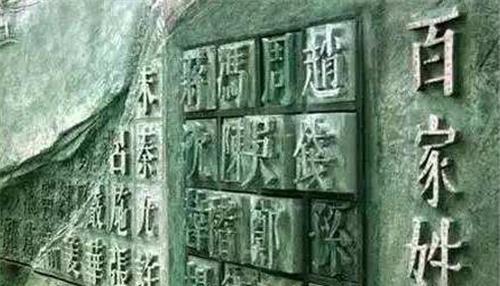Chinese surnames, like Chinese culture, have a long history, and have undergone thousands of years of development and improvement to form today's surname system. I remember when I was a child, I once bought a collection of "Hundred Family Names", "Thousand Character Text", "Three Character Classic" and "Disciple Rules", and learned about 500 more common surnames from "Hundred Family Names".

However, because my vision was very narrow at that time, I once thought that all the surnames in China were in the "Hundred Family Names". When I grew up, I looked up the information about surnames and learned that "Hundred Family Names" was far from putting all the surnames in China together.
Of course, we can't blame "Hundred Family Names", after all, Chinese surnames not only have Zhang, Wang, Li, Liu and other familiar surnames, there are many more unknown surnames, in short, there are about five or six thousand Chinese surnames, of which there are also single-word surnames, two-word surnames and even three-word surnames and more than three-character surnames, very messy, without in-depth research is not easy to understand.
Today, I would like to introduce you to a few very rare surnames, I believe that friends do not need to say that they met, and they may not even have heard of it.
The first is the Tumen surname. The surname sounds fierce, but it does have to do with butchers. In the "Book of Han and the Biography of Wang Mang", it is recorded that there was an official named Tu Men Shao. In the family tree of the Tumen family, their ancestors were originally a high-ranking and powerful official, but because they had the misfortune of offending the traitors for the integrity of the officials, they were reduced to commoners.
In order to maintain his livelihood, he became a butcher and sold meat for a living, but in order to distinguish himself from other butchers, it was called "Tumen". However, because the surname sounds a bit bloody, or even unlucky, so future generations have changed their surnames, and this surname has unfortunately not been passed down.
The second surname is Gluttony. As we all know, Gluttony is talking about the Ancient Divine Beast, a fierce and gluttonous beast, but it is completely a coincidence that it can become a surname.
At that time, during the Southern and Northern Dynasties, Xiao Ji wanted to rebel, so he prepared a large number of gold and silver jewelry in advance to reward those who had made meritorious achievements, who knew that later these people made meritorious deeds, but they did not get these gold and silver jewelry, so the military's heart was scattered. At that time, after Xiao Ji's rebellion failed, in order to humiliate him to the greatest extent, he changed the surname of his descendants to Gluttony.
However, before long, Xiao Ji's descendants all changed to Xiao's surname after discovery, so there was no need for this surname to exist. In fact, gluttony should not have been a surname, but it was just a joke of history.
The third surname is the surname 刕. The surname is not very old. During the Kangxi Dynasty, there was a man named Dao Kui, as the name suggests, the knife of the big knife and the kui of Li Kui, which were definitely not easy to provoke. Sure enough, Dao Kui is an outlaw, and his daily "work" is to do all the bad things, which can be described as no evil.
However, although he was not afraid of death, after all, he also had a family. In order not to drag his family down, he asked his family to change their surnames so as not to be hunted down and killed by the enemy family. The family of Dao Kui did not want to leave their ancestors, so they changed to the surname of Jiao. However, because this word is not common and does not fit as a surname, and it feels very murderous, the surname has not been retained.
The last surname is Success. Yes, you read that right, this word that we are very familiar with is also a surname, and it has been around for a long time.
Legend has it that in ancient times, the flood caused the people to suffer, and after Dayu successfully managed the flood, his descendants began to have some people succeed in commemorating Dayu's exploits. It may be that posterity feels that the surname of success is too dazzling, and gradually gives up this surname, and success disappears in the long river of history.
In my opinion, although the word success is used frequently in daily life, it really does not fit as a surname, which is a pity that it has been lost in Chinese surnames.
With the development of the times, it is normal that many names have not been passed down for various reasons. But we should protect those surnames that are very small in number and diversify our Chinese culture. Of course, for surnames, most of the Chinese will not change at will, after all, it is left by the ancestors. The four very rare surnames just mentioned are domineering, and if they can be encountered, this person will not be simple.